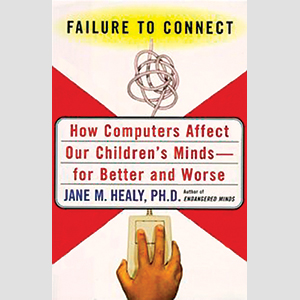
Failure to Connect
 With schools spending billions on technology while simultaneously cutting funding for the arts and physical education, Jane M. Healy, author of Failure to Connect: How Computers Affect Our Children’s Minds – for Better and Worse, questions whether computers are really helping children’s development. Many have jumped on the technology bandwagon; however, Healy warns parents and even educators who have come to believe computer skills rival reading and math. As far as Healy is concerned, unless implemented by properly trained teachers and parents, computers can actually shortchange your children’s future, as it draws children away from other developmentally important activities as reading, hobbies, and creative play.
With schools spending billions on technology while simultaneously cutting funding for the arts and physical education, Jane M. Healy, author of Failure to Connect: How Computers Affect Our Children’s Minds – for Better and Worse, questions whether computers are really helping children’s development. Many have jumped on the technology bandwagon; however, Healy warns parents and even educators who have come to believe computer skills rival reading and math. As far as Healy is concerned, unless implemented by properly trained teachers and parents, computers can actually shortchange your children’s future, as it draws children away from other developmentally important activities as reading, hobbies, and creative play.
That’s why the American Academy of Pediatricians recommends no screen time before the age of two and less than one hour of screen time for older, school-aged children. That’s television, computer, and iPad combined! Sadly, most parents totally ignore this recommendation, failing to recognize that no research exists to support the edutainment technology offers. In fact, the little research that does exist actually suggests a negative impact of technology on our children, which is why Healy’s book examines the four potential physical risks to the developing child: the visual problems, the postural and skeletal problems, the dangers of radiation, and the displacement of normal physical activities of childhood and adolescence.
Yet in our society the mother who lets her child play outside unsupervised is arrested while mothers who allow their children to be babysat by technology are accepted. According to Julian Sefton-Green and David Buckingham, researchers at the University of London, “Parents tend to greatly overestimate the power of computer hardware to help their youngsters’ learning and ‘secure their educational future.’”
Schools are also falling victim to this same incorrect assumption. Failure to Connect explains, “School districts are lining up to spend scarce education dollars on equipment that stands a good chance of being outdated in two or three years. These funds, as well as the considerable space needed for the computers, are often drawn from more developmentally important areas, such as physical education, art, music, drama, traditional library resources, and textbook purchases.”
Healy points out the following about learning:
- Just because children like something does not mean it is good for them.
- Learning is fun but it is also hard work.
- Accessing isolated information has nothing to do with true learning, which requires making meaningful connections between facts and ideas.
- Some of the ‘habits of mind’ fostered by technology are dangerous to wit: impulsivity, trial-and-error guessing over thoughtful problem-solving, disregard of consequences, and expectation of overly easy pleasure.
I know what you’re thinking. Well, the computer is better than watching TV. According to Healy, it’s not. “The novel special effects make [computers] even more engrossing and potentially mind-dulling than the tube.” In fact, Healy argues, computer learning is “far less brain-building than even such simple activities as spontaneous play or playing board games with an adult or older child.”
Ereaders aren’t any better off. Instead of a white piece of paper with black print, the illuminated screen, which continually refreshes so the image doesn’t fade, stresses both the visual system and the brain. Couple this with the fact that “video display terminals emit both very-low-frequency and extremely-low-frequency electromagnetic radiation” and our children are potentially in for all kinds of problems.
“It is perhaps typical of a society that seems to care more for hi-tech than for the health of our young that these issues have been so effectively swept under the carpet,” Healy adds. “Who wants to think about carpal tunnel syndrome, impaired vision, postural complaints, or even radiation emissions? Asking such questions is likely to get you labeled as a weirdo trying to block progress and hold back our ability to ‘get ahead.’”
Since Healy wrote Failure to Connect, numerous health experts and developmental psychologists continue to express grave concerns about this dangerous trend. Unfortunately, despite the warnings, more and more parents not only permit their children to constantly turn to technology but also encourage it. Therefore, it should come as no surprise to learn the child’s mind is growing just as endangered as much as the outdoors he ignores.
Follow @WinterhalterV on Twitter for updates on blog posts or like Parenting by the Book on Facebook.
Read my other blog Befriending Forty.






